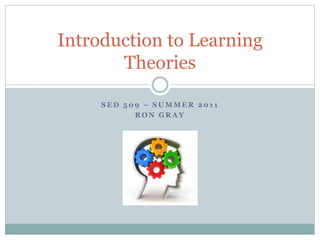
Learning Theory Overview for Educators
- 1. S E D 5 0 9 – S U M M E R 2 0 1 1 R O N G R A Y Introduction to Learning Theories
- 2. Definition: Learning is… A change in behavior as a result of experience or practice. The acquisition of knowledge. Knowledge gained through study. To gain knowledge of, or skill in, something through study, teaching, instruction or experience. The process of gaining knowledge. A process by which behavior is changed, shaped or controlled. The individual process of constructing understanding based on experience from a wide range of sources.
- 3. Some First Principles Learning is something all humans do Fetuses learn Infants learn Children learn Adults learn Learning is not uniquely human – all living things learn Learning evolved as an adaptation for promoting survival
- 4. What is Learning? Learning is a process Learning is a product
- 5. Process of Learning Learning involves the individual Brain Body Learning involves others Dyads Groups Organizations Communities Society Learning takes place somewhere In physical environment With things and tools Learning occurs over time
- 6. Products of Learning Learning is about ideas and concepts Learning is about behaviors and skills Learning is about attitudes and values
- 7. Definition: Theories are… What is a theory? A theory provides a general explanation for observations made over time. A theory explains and predicts behavior. A theory can never be established beyond all doubt. A theory may be modified. Theories seldom have to be thrown out completely if thoroughly tested but sometimes a theory may be widely accepted for a long time and later disproved.
- 8. So, how do people learn? Easy answer: We don’t know for sure. Difficult answer: We have multiple theories that provide glimpses of an answer from many different perspectives. These stem from psychologists, philosophers, sociologists, anthropologists, evolutionary biologists, linguists, neuroscientists…
- 9. Broad domains of theories Behaviorism (Ch. 3) Constructivism (Ch. 5) Sociocultural (Ch. 6) Cognitivism (Ch. 7) I believe that (the) educational process has two sides— one psychological and one sociological. . . Profound differences in theory are never gratuitous or invented. They grow out of conflicting elements in a genuine problem. -John Dewey, In Dworkin, M. (1959) Dewey on Education
- 10. How did we get to this point? A bit of history… Where can truth and knowledge be found?
- 11. Plato (428-347ish B.C.E.) Truth is found within ourselves (rationalist) Ideas do not belong to the actual world: They are too perfect (e.g., one’s conception of triangles or circles). They belong to the REAL world, in which ideas are eternal and flawless. Knowledge innate—in place at birth Knowledge “drawn out” when teacher asks questions; help students recall fundamental insights they possess (self reflection) Learning passive process
- 12. Plato’s Allegory of the Cave
- 13. Aristotle (470–399 BCE) Truth is found outside of ourselves using our senses (Empiricist) Developed a scientific method of gathering data to study the world around him. “There’s nothing in the intellect that wasn’t previously in the senses”
- 14. John Locke (1632-1704) Plato is wrong, Aristotle is right. “Tabula rasa” or “blank slate” theory of learning. “Let us then suppose the mind to be … white paper, void of all characters, without any ideas. How comes it to be furnished? Whence comes it by that vast store, which the busy and boundless fancy of man has painted on it with an almost endless variety? Whence has it all the materials of reason and knowledge? To this I answer, in one word, from experience. In that all our knowledge is founded; and from that it ultimately derives itself.”
- 15. John Locke (1632-1704) Enter world devoid of content but with biologically preformed capacities & processes. Immediately experience environment through senses. “Simple ideas” remembered and built upon by “internal” phenomena (concentration, puzzlement, etc.). Simple ideas not invented; child must have experience to develop & all complex ideas trace back to combinations of simple ideas. Learner still passive; experience happens to learner rather than learner engaging in it, even perhaps creating it.
- 16. So what? Why is an understanding of learning theory important for educators?
- 17. Epistemology Our beliefs about the nature of knowledge, our epistemology, profoundly influence our approach to education.
- 18. Psychology of Learning Our beliefs about how people learn, our psychology of learning, profoundly influence our approach to education.
- 19. Epistemology – Theory - Practice All three of these need to align Our beliefs about knowledge Our beliefs about learning Our strategies for practice
- 20. Learning theories as glasses What would a classroom look like as viewed through the lens of: Plato (rationalist) Aristotle (empiricist) Locke (tabula rasa) Or from these perspectives? Behaviorism Constructivism Sociocultural Cognitivism
- 21. What does learning look like?
- 22. Your assignment In groups of 3 Read assigned chapter & other resources as needed Prepare 20-minute lesson for Wednesday morning Lesson must: Be engaging (no 20-minute lectures!) Include at least one activity Utilize at least one case (either from the book or elsewhere) Have a beginning, middle, and end (including wrap-up) Be clear and concise.